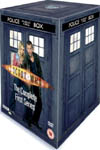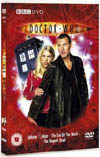DVD Extras (box sets only) include:
Many of the story's better bits are the sombre character moments where the Doctor and Rose explore the setting literally and philosophically, as well as digging deeper into each other's characters. Intriguingly, the Doctor, in particular, seems to be harbouring a few more secrets than he did during the program's initial 26 year run. But checking out the scenery will only stretch so far. Every story needs a plot, and this one seems to want to fall back on the whodunit bottle story formula, which usually produces great results. The Doctor and Rose quickly meet the rest of the cast of characters, whose extreme and varied alienness provides a nice sequence of initiating Rose to the kind of thing she needs to expect when traveling with the Doctor. Nice. But the aliens are presented in a manner that's more arbitrary than real, paraded in and being announced to those already in the room (chiefly just the Doctor and Rose), but not to those still waiting to make their entrance. The Doctor's psychic paper is a nice touch, worthy of standing beside K9 and the sonic screwdriver as one of the show's staple devices. Most of the aliens also remain more caricatures than characters though. For the whodunit plot to really kick in and become enjoyable, the story needs to be about twice as long, allowing for the character exploration, clues, details, and red herrings that make such tales compelling. This time, there just isn't time. Some added depth comes through with Jabe, the Steward, and the "plumber" in the corridor, mostly through the performances of the actors. More of this would have done the story credit. Another bad point is the architecture of one of the story's key rooms. So you've got a huge wide shaft with several large rotating fans inside of it. Fair enough. Now what engineer in his right mind would put controls and a door on opposite sides of that shaft, connected only by a ramp that goes directly and dangerously under the fans, especially when there's plenty of safe space on either side? One look, and any member of the audience can correctly guess that someone's going to be making a dangerous crossing. The action here proceeds predictably and fails to become interesting.... until the very last seconds, as the Doctor gets one of the best final climactic acts of the season. It's just such a shame that it was set up in such a blatantly artificial way and over-dramatized during the build-up. The story's biggest black mark is the ridiculous bombshell that the Doctor drops for fans of the original series - that his home planet of Gallifrey, upon which we've already witnessed many adventures, no longer exists. This is additionally confusing in a series about time travel, for he fails to elaborate on exactly when this destruction took place. Previous Doctors have traveled into the future, never doubting Gallifrey's continued existence. In fact, it is implied that the adventures on Gallifrey take place in the future. Now this Doctor travels into the past and mourns its loss, unable to sense any "telepathic" connection with members of his own race as he says he used to. This only makes sense to me if he's chosen his way into a parallel universe with a different history, which is a perfectly cool story arc to be exploring this season. That would also mean that the Gallifrey that we've all seen and known and loved is still living and breathing through its natural life cycle as nicely as you please in the home universe. Sadly, I think the writers aren't as sophisticated in their understanding of time to really know what they're doing with this, and can't yet pass that understanding on to the Doctor or any of the other characters. If they were trying to dictate that no more stories on Gallifrey should be written, simply focusing on other places would be more effective. I suspect this method has most fans dreaming of ways to bring Gallifrey back instead. If it was simply meant to give the Doctor something to mourn and mope over, it's one of the worst ideas for character depth I've ever seen overused by Star Trek writers like Ronald D. Moore, and I certainly don't appreciate more of it on Doctor Who. Bad move.
International Titles:Deutsch: "Das Ende der Welt"Magyar: "Amikor vége lett a világnak" Français: "La Fin du monde" Русский: "Конец света" Italiano: "La fine del mondo"
This story has become available on DVD:
Note: The 13-episode box sets contain commentaries, behind-the-scenes featurettes, and other extras. The 3-episode volumes only feature the plain episodes. Comments on this article are welcome. You may contact the author from this page:
|








